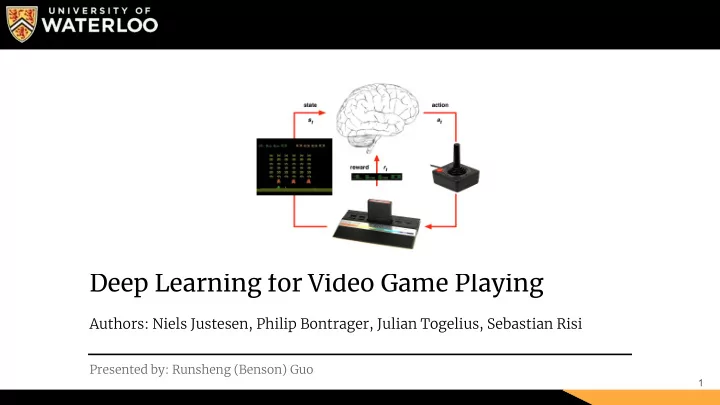

Deep Learning for Video Game Playing Authors: Niels Justesen, Philip Bontrager, Julian Togelius, Sebastian Risi Presented by: Runsheng (Benson) Guo 1
Outline ● Background ● Methods ● History ● Open Challenges ● Recent Advances 2
Background: Neural Networks Recurrent Neural Network Convolutional Neural Network 3
Background: Neural Network Optimization ● Supervised Learning ● Unsupervised Learning ● Reinforcement Learning ● Evolutionary Approaches ● Hybrid Learning Approaches 4
Methods Platforms: Arcade Learning Environment (ALE) ● Retro Learning Environment (RLE) ● OpenAI Gym ● Many more! ● Genres: Arcade Games ● Racing Games ● First-Person Shooters ● Open-World Games ● Real-Time Strategy ● Text Adventure Games ● 5
Methods: Arcade Games Characteristics: 2-Dimensional Movement ● Continuous-time Actions ● Challenges: Precise timing ● Environment navigation ● Long term planning ● 6
Methods: Arcade Games Deep Q-Learning: Replay buffer, separate target network, recurrent layer ● Distributed DQN ● Double DQN ● Prioritized experience replay ● Dueling DQN ● NoisyNet DQN ● Rainbow ● Actor-Critic: A3C ● IMPALA ● UNREAL ● 7
Methods: Arcade Games Other Algorithms: Deep GA ● Frame prediction ● Hybrid reward architecture ● Montezuma’s Revenge: Very sparse rewards ● Hierarchical DQN ● Density models ● Text instructions ● 8
Methods: Racing Games Characteristics: Minimize navigation time ● Continuous-time Actions ● Challenges: Precise inputs ● Short & long term planning ● Adversarial planning ● 9
Methods: Racing Games Paradigms: Behaviour reflex (sensors → action) ● Direct perception (sensors → environment information → action) ● Algorithms: (Deep) Deterministic policy gradient ● A3C ● 10
Methods: First-Person Shooters Characteristics: 3-Dimensional Movement ● Player Interaction ● Challenges: Fast reactions ● Predicting enemy actions ● Teamwork ● 11
Methods: First-Person Shooters Algorithms: Deep Q-learning ● A3C ● UNREAL ○ Reward shaping ○ Curriculum learning ○ Direct future prediction ● Distill and transfer learning ● Intrinsic curiosity module ● 12
Methods: Open-World Games Characteristics: Large world to explore ● No clear goals ● Challenges: Setting meaningful goals ● Large action space ● 13
Methods: Open-World Games Algorithms: Hierarchical deep reinforcement learning network ● Teacher-student curriculum learning ● Neural turing machines ● Recurrent memory Q-network ○ Feedback recurrent memory Q-network ○ 14
Methods: Real-Time Strategy Characteristics: Control multiple units ● simultaneously Continuous-time Actions ● Challenges: Long term planning ● Delayed rewards ● 15
Methods: Real-Time Strategy Algorithms: Unit control ● Zero order optimization ○ Independent Q-learning ○ A3C ○ Multiagent Bidirectionally-Coordinated Network ■ Counterfactual Multi-Agent ■ Build order planning ● Supervised learning ○ Reinforcement learning ○ Double DQN ■ Proximal Policy Optimization ■ 16
Methods: Text Adventure Games Characteristics: Text-only states & actions ● Choice, hyperlink & parser ● interfaces Challenges: Natural language processing ● Large action space ● 17
Methods: Text Adventure Games Algorithms: LSTM-DQN ● Deep Reinforcement Relevance Net ● State affordances ● Action elimination network ● 18
History Trends: Incremental extensions ● DQN ○ A3C ○ Parallelization ● A3C ○ Evolutionary algorithms ○ 19
Open Challenges ● Agent modelling ○ General game playing ○ Human-like behaviour ○ Delayed/sparse rewards, multi-agent learning, dealing with large action spaces ● Game industry Adoption ● Developing model-based algorithms ● Improving computational efficiency 20
Conclusion Recent Advances: Model-Based Reinforcement Learning for Atari (Kaiser et al, 2019) ● AlphaStar (DeepMind, 2019) ● OpenAI Five (OpenAI, 2019) ● Future Work: Survey focusing on a single class of deep learning algorithms ● Survey focusing on a single genre of video games ● 21
Recommend
More recommend